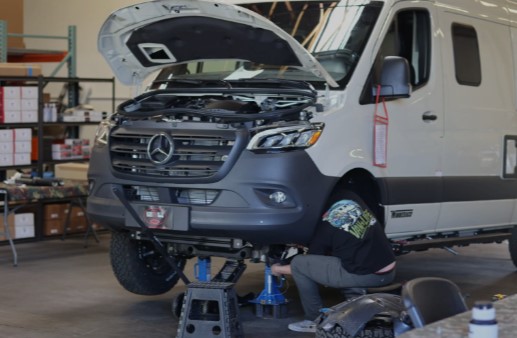Introduction
The suspension system of a vehicle plays a critical role in providing stability, control, and comfort while driving. In the case of vans, this becomes even more important as they are designed to carry heavy loads, which can greatly affect their handling and ride quality.
In this article, we will explore the various ways in which van suspension systems can be optimized to improve load handling and comfort for a smoother driving experience.
Weight Distribution
One of the key factors that affect the performance of a van’s suspension system is weight distribution. As vans are designed to carry heavy loads, it is crucial to distribute the weight evenly across all four wheels to maintain balance and stability.
Uneven weight distribution can cause one side of the vehicle to sag, resulting in poor handling and increased wear on the suspension components. To optimize weight distribution, it is essential to distribute the load properly within the van’s cargo area and ensure that heavy items are placed closer to the ground.
Upgraded Shocks and Springs
Another way to improve a van’s load handling capabilities is by upgrading its shocks and springs. Heavy-duty shocks and stiffer springs can better support the weight of a loaded van, minimizing body roll and providing a more stable ride.
Additionally, these upgrades also improve the overall handling of the vehicle, making it easier to control when carrying heavy loads. It is important to consult with a professional mechanic or suspension specialist to determine the best shocks and springs for your specific van model.
Air Suspension Systems
Air suspension systems have become increasingly popular in vans due to their ability to adjust the vehicle’s height and stiffness. These systems use airbags instead of traditional springs, allowing for smoother and more precise adjustments.
Air suspension systems can be manually or electronically controlled, making it easier to adapt the van’s suspension to various load sizes and road conditions. However, these systems can be costly and require regular maintenance, so it is important to carefully consider the benefits and drawbacks before investing in one.
Tires and Alignment
The type of tires used on a van can also greatly affect its load-handling capabilities. Tires with higher load ratings can better support heavy loads, while proper wheel alignment ensures that the vehicle’s weight is evenly distributed across all four wheels.
Regular tire rotations and proper inflation are also crucial for maintaining tire health and ensuring a smooth ride. It is recommended to consult with your vehicle’s manufacturer or a tire specialist to determine the best tires for your van based on its weight capacity and intended use.
Suspension Bushings
Suspension bushings are another crucial component that can impact a van’s load handling and comfort. These bushings act as cushions between the suspension components and the vehicle’s frame, helping to absorb vibrations and reduce noise. Upgrading to high-quality or heavy-duty suspension bushings can provide better dampening and improve the overall stability of the van, especially when carrying heavy loads. Enhanced bushings can also prolong the lifespan of other suspension components by reducing stress and wear. Consult with a suspension specialist to identify the best bushing options for your van.
Regular Maintenance
Routine maintenance is essential for ensuring that a van’s suspension system remains in optimal condition. Regularly inspecting components such as shocks, springs, bushings, and tires can help identify and address issues before they become major problems. This proactive approach can lead to better load handling, increased safety, and improved driving comfort. Additionally, periodic alignment checks and adjustments can prevent uneven tire wear and ensure that the van performs consistently under various load conditions. Sticking to a maintenance schedule as recommended by the vehicle’s manufacturer or a trusted mechanic will help keep the suspension system in top shape.
Conclusion
Properly optimizing a van suspension system is crucial for improving its load-handling capabilities and overall comfort. By considering factors such as weight distribution, shock, and spring upgrades, air suspension systems, tires and alignment, suspension bushings, and regular maintenance, van owners can ensure a smoother driving experience even when carrying heavy loads. Consult with professionals to determine the best strategies for optimizing your van’s suspension system and enjoy a more stable, controlled, and comfortable ride.
